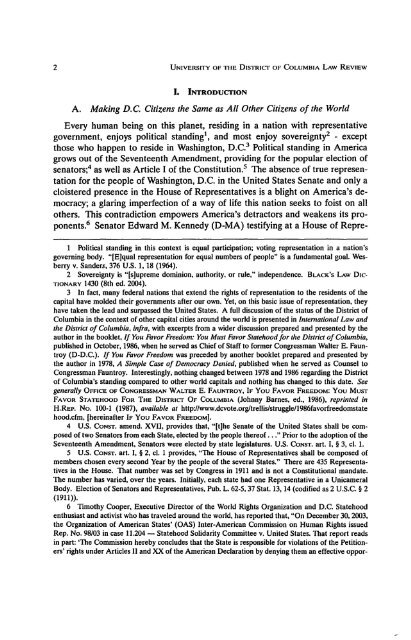Download - UDC Law Review
Download - UDC Law Review
Download - UDC Law Review
You also want an ePaper? Increase the reach of your titles
YUMPU automatically turns print PDFs into web optimized ePapers that Google loves.
2 UNIVERSITY OF THE DISTRICr OF COLUMBIA LAW REVIEWI. INTRODUCTIONA. Making D. C. Citizens the Same as All Other Citizens of the WorldEvery human being on this planet, residing in a nation with representativegovernment, enjoys political standing l , and most enjoy sovereignty2 - exceptthose who happen to reside in Washington, D.C. 3 Political standing in Americagrows out of the Seventeenth Amendment, providing for the popular election ofsenators;4 as well as Article I of the Constitution. s The absence of true representationfor the people of Washington, D.C. in the United States Senate and only acloistered presence in the House of Representatives is a blight on America's democracy;a glaring imperfection of a way of life this nation seeks to foist on allothers. This contradiction empowers America's detractors and weakens its proponents.6 Senator Edward M. Kennedy (D-MA) testifying at a House of Repre-1 Political standing in this context is equal participation; voting representation in a nation'sgoverning body. "[E]qual representation for equal numbers of people" is a fundamental goal. Wesberryv. Sanders, 376 U.S. I, 18 (1964).2 Sovereignty is U[s]upreme dominion, authority, or rule," independence. BLACK'S LAW DICTIONARY 1430 (8th ed. 2004).3 In fact, many federal nations that extend the rights of representation to the residents of thecapital have molded their governments after our own. Yet, on this basic issue of representation, theyhave taken the lead and surpassed the United States. A full discussion of the status of the District ofColumbia in the context of other capital cities around the world is presented in International <strong>Law</strong> andthe District of Columbia, infra, with excerpts from a wider discussion prepared and presented by theauthor in the booklet, If You Favor Freedom: You Must Favor Statehood for the District of Columbia,published in October, 1986, when he served as Chief of Staff to former Congressman Walter E. Fauntroy(D-D.C.). If You Favor Freedom was preceded by another booklet prepared and presented bythe author in 1978, A Simple Case of Democracy Denied, published when he served as Counsel toCongressman Fauntroy. Interestingly, nothing changed between 1978 and 1986 regarding the Districtof Columbia's standing compared to other world capitals and nothing has changed to this date. Seegenerally OFFICE OF CONGRESSMAN WALTER E. FAUNTROY, IF You FAVOR FREEDOM: You MUSTFAVOR STATEHOOD FOR THE DISTRICT OF COLUMBIA (Johnny Barnes, ed., 1986), reprinted inH.REP. No. 100-1 (1987), available at http://www.dcvote.orgltrellis/struggle/1986favorfreedomstatehood.cfm, [hereinafter IF You FAVOR FREEDOM].4 U.S. CONST. amend. XVII, provides that, "[t]he Senate of the United States shall be composedof two Senators from each State, elected by the people thereof ..." Prior to the adoption of theSeventeenth Amendment, Senators were elected by state legislatures. U.S. CoNST. art. I, § 3, c1. 1.5 U.S. CONST. art. I, § 2, c1. 1 provides, "The House of Representatives shall be composed ofmembers chosen every second Year by the people of the several States." There are 435 Representativesin the House. That number was set by Congress in 1911 and is not a Constitutional mandate.The number has varied, over the years. Initially, each state had one Representative in a UnicameralBody. Election of Senators and Representatives, Pub. L. 62-5, 37 Stat. 13, 14 (codified as 2 U.S.c. § 2(1911».6 Timothy Cooper, Executive Director of the World Rights Organization and D.C. Statehoodenthusiast and activist who has traveled around the world, has reported that, "On December 30, 2003,the Organization of American States' (OAS) Inter-American Commission on Human Rights issuedRep. No. 98/03 in case 11.204 - Statehood Solidarity Committee v. United States. That report readsin part: 'The Commission hereby concludes that the State is responsible for violations of the Petitioners'rights under Articles II and XX of the American Declaration by denying them an effective oppor-














